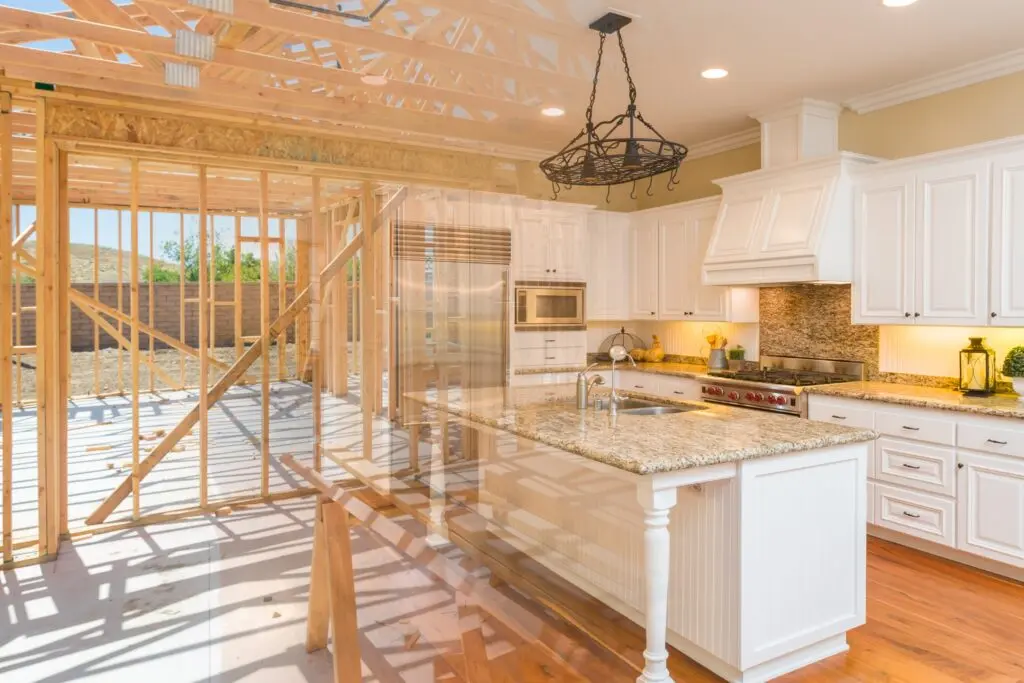Buying a home is the most common path to homeownership. However, building a home can be incredibly rewarding. So, how do you choose between buying a home or building your own?
Keep in mind, whether you’re buying or building, appliance and system costs add up. Select Home Warranty offers home appliance and system coverage. In the case of any breakdowns in your home, the cost to repair or replace is covered.
How does home building and home buying compare?
When considering whether to buy or build your next house, you have three main points to consider.
1. Customization
Home is where you spend most of your time and is a foundation within your life.
When building a house, hiring the right contractor should be considered prior to the build. Be sure to check their previous work, entertain multiple bids/estimates, and confirm their capabilities. Never feel afraid to intervene if you’re feeling unheard. After all, it’s your house.
An undeniable benefit of building your own house is the ability to customize it to your liking. This includes kitchen appliances, the outside façade, home flooring, room layout, and so much more. All decisions are yours to make when going with a new construction.
When it comes to buying an already-built home, there are limits to what you can customize. Of course, you can replace appliances, fixtures, flooring, and wall color, among other things. This may be quite costly depending on product shortages and labor, so take this into consideration when you’re comparing against the build process.
Takeaways:
- Building a home allows for any amount of customization, as long as you’re within budget.
- Buying a house has much less customization and will require a customization budget after you own the home.
- If you care most about customizing your home, building it will make your dreams into a reality.
2. Affordability
It’s not uncommon for homes to feel more costly than you can keep up with. It’s also standard to experience the urge to keep updating your home with each new trend. The truth is that building a home is expensive, while home buying is less so. Of course, these savings come with compromise – you’re also less likely to get exactly what you want.
When finding affordability to build a house, may have to factor in material and labor shortages. As a result, the budget behind building a home can quickly get out of control.
Building materials are an important factor. Communicating with your home builder early in the process can help you understand building material costs to get your intended home style.
In most cases, those building a home may need to take out a construction loan. These loans are typically issued for a 12- to 18-month period. Unlike a mortgage or home loan, construction isn’t backed by a house – the house is still being built – so the approval process is a little more complicated than taking out a mortgage.
It’s not uncommon for unanticipated costs to occur throughout the process. In short, expect the unexpected.
On the other hand, buying a home can be a lot more cost-effective than building. It’s quite common to buy a house knowing you plan on sprucing it up to your liking. If the ongoing construction doesn’t bother you, the costs of fixing a home are often less than building one.
You could start by getting a mortgage preapproval. This can speed up the process, as real estate agents prefer assurance that the home can be afforded. A preapproval can also be used to your advantage in a competitive market. While the highest offer is usually appealing, it means nothing if the deal falls through.
While a typical mortgage can range from 10-30 years, sometimes a homeowner doesn’t plan on staying in that area for nearly that long. If you’re planning on paying off the loan in full or selling before the adjustment period kicks in, seeking an adjustable-rate mortgage (ARM) is something to consider.
The possibility that your payment could decrease if interest rates fall or are typically lower than that of a conventional mortgage could make an ARM the right option for you.
Takeaways:
- The process of building a home factors in many unexpected costs and requires a special construction loan with a time limit.
- The process of buying a home has clearer costs and steps to take for mortgage preapproval, leading to an easier sale on your choice home.
- Determining affordability for a home is easier when buying, but the downside is whether you have the budget to renovate after the home’s purchase.
3. Home Maintenance
When deciding to become a homeowner, budgeting for home maintenance is essential.
You can expect maintenance and upkeep costs to be lower for newly built homes. This is a huge benefit to the idea of building over buying. While maintenance for newer homes is less expected, any appliance can break or malfunction and require service. It’s a part of being a homeowner and is generally inevitable regardless of use.
Consider buying a slightly more expensive appliance or product with little to no maintenance required versus a cheaper one that is known to experience issues or be faulty down the road.
It’s easy to overlook the smaller things, like roofing materials. Choosing the right roof for your home based on climate and style could mean the difference between lasting 20 years or 10 years.
If you’re leaning towards buying a house, budgeting still applies, even more so. Costs could quickly accumulate if your home is an older build, especially if you plan to address concerns with asbestos or lead paint.
The age of appliances in the home, HVAC system, and last roof replacement, are some questions to ask yourself and a realtor to get a better idea of what you can expect in the future. Consider the benefits of a home warranty and protect your appliances. Keep in mind the unexpected cost of repairs, as this may give you an edge in the negotiating process.
A common homebuyer request is for the sale of the home to include a home warranty. When the seller, title company, or real estate agent includes a home warranty, the used appliances and systems coming with the home are protected in the case of a malfunction or breakdown.
Pro Tip: Make sure to get a record of all previous maintenance on each appliance and system.
Takeaways:
- Newly built homes should require less expected maintenance, as everything is brand new.
- Buying a home will come with expected maintenance, though this depends on the age of the home and fixtures inside.
- Home warranties are very attractive for home buyers and can help ensure appliances and systems will be serviced after the sale of the home.
What are the next steps for home buying vs building a home?
Homeowners are left with endless questions throughout the duration of ownership. To help during the decision-making process, look online for homes you like. Pull characteristics from these listings and, when the time is right, you’ll be ready to either build or buy your dream home knowing exactly what goes into it.
Don’t forget the perks of a home warranty
Are you budgeting for your dream home and want complete peace of mind?
Home warranties can help relieve stress when it comes to worrying about the status of any appliance. From your dishwasher to your electrical system, have a plan ready to keep the most essential areas of your home running smoothly.
Get a quote today and find the best plan for your home systems and appliances. Give us a call at 800-670-8931 to learn how a home warranty can benefit your property.

